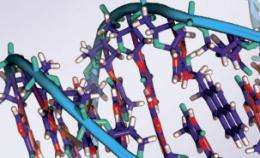Potential new drug target may protect against certain neurodegenerative diseases

Penn Medicine researchers have discovered that hypermethylation - the epigenetic ability to turn down or turn off a bad gene implicated in 10 to 30 percent of patients with Amyotrophic Lateral Sclerosis (ALS) and Frontotemporal Degeneration (FTD) - serves as a protective barrier inhibiting the development of these diseases. Their work, published this month in Neurology, may suggest a neuroprotective target for drug discovery efforts.
"This is the first epigenetic modification of a gene that seems to be protective against neuronal disease," says lead author Corey McMillan, PhD, research assistant professor of Neurology in the Frontotemporal Degeneration Center in the Perelman School of Medicine at the University of Pennsylvania.
Expansions in the offending gene, C9orf72, have been linked with TAR DNA binding protein (TDP-43) which is the pathological source that causes ALS and FTD. "Understanding the role of C9orf72 has the possibility to be truly translational and improve the lives of patients suffering from these devastating diseases," says senior author, Edward Lee, MD, PhD, assistant professor of Neuropathology in Pathology and Laboratory Medicine at Penn.
McMillan and team evaluated 20 patients recruited from both the FTD Center and the ALS Center at the University of Pennsylvania who screened positive for a mutation in the C9orf72 gene and were clinically diagnosed with FTD or ALS. All patients completed a neuroimaging study, a blood test to evaluate C9orf72 methylation levels, and a brief neuropsychological screening assessment. The study also included 25 heathy controls with no history of neurological or psychiatric disease.
MRI revealed reduced grey matter in several regions that were affected in patients compared to controls. Grey matter is needed for the proper function of the brain in regions involved with muscle control, memory, emotions, speech and decision-making. Critically, patients with hypermethylation of C9orf72 showed more dense grey matter in the hippocampus, frontal cortex, and thalamus, regions of the brain important for the above described tasks and affected in ALS and FTD, suggesting that hypermethylation is neuroprotective in these regions.
To validate these findings, the Penn team also looked at autopsies of 35 patients with C9orf72 expansions and found that their pathology also suggested that increased methylation was associated with reduced neuronal loss in both the frontal cortex and hippocampus.
Longitudinal analysis was performed in 11 of the study patients to evaluate the neuroprotective effects of hypermethylation in individuals over their disease course. This showed reduced changes in grey matter of the hippocampus, thalamus, and frontal cortex, associated with hypermethlation suggesting that disease progresses more slowly over time in individuals with C9orf72 hypermethylation. Longitudinal neuropsychological assessments also showed a correlation between protected memory decline and hypermethylation.
These findings are consistent with a growing number of studies which have suggested the neuroprotective effects of the hypermethylation of C9orf72. "We believe that this work provides additional data supporting the notion that C9orf72 methylation is neuroprotective and therefore opens up the exciting possibility of a new avenue for precision medicine treatments and targets for drug development in neurodegenerative disease," says McMillan.
















